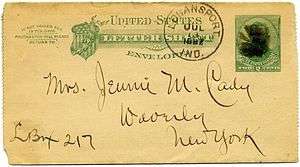Earliest reported postmark

The term Earliest Reported Postmark or ERP is a term used by the United Postal Stationery Society (UPSS) for the past 40 years. They have established a database in which the earliest postmarks on stamped envelopes of postal card or letter sheets is kept. Postmarks are typically dated from days to many months after the date of issuance. An envelope can come out in varying sizes, colors, or shapes without notification to the public. Collecting the ERP for a particular variety is an ongoing effort.
An ERP is different from the term First day of issue where there is a first day of issue postmark and frequently a pictorial cancellation, indicating the city and date where the item was first issued. Although primarily a US undertaking, recently the UPSS has expanded the project to include the issues of Cuba during the US occupation (1898-1902)[1] and the Republic (1902-1958).
ERPs are collected by the entire or cover (the entire envelope). The obvious reason for this is that an envelope's knife or size could not be determined if the specimen was a cut square or full corner, even if the entire postmark is retained.
ERPs are collected for postal cards as well.[2] For the 50+ years of postal card use there was no "first day of issue" as we now know it. Cards would not necessarily be available on any announced day as postmasters were ordered to exhaust existing supplies before ordering more.[2] Previous to 1926, ERPs exist up to several months after announced availability dates.